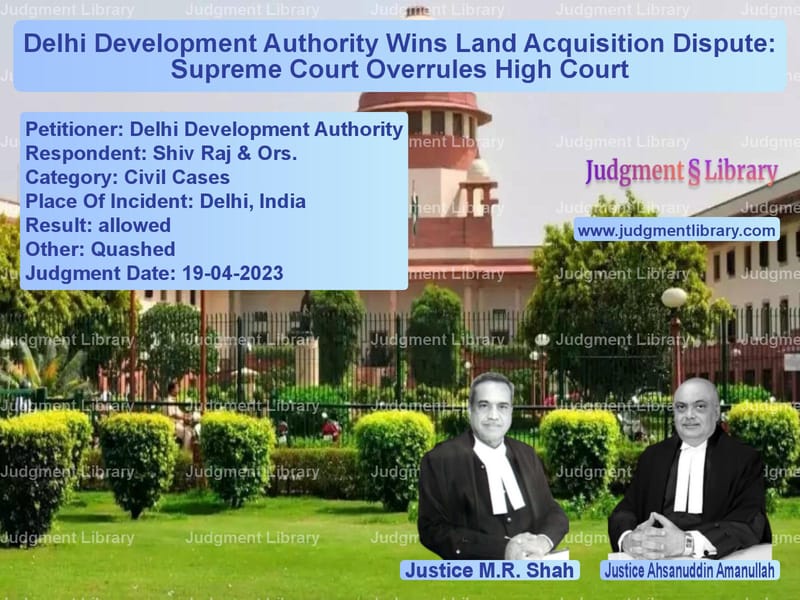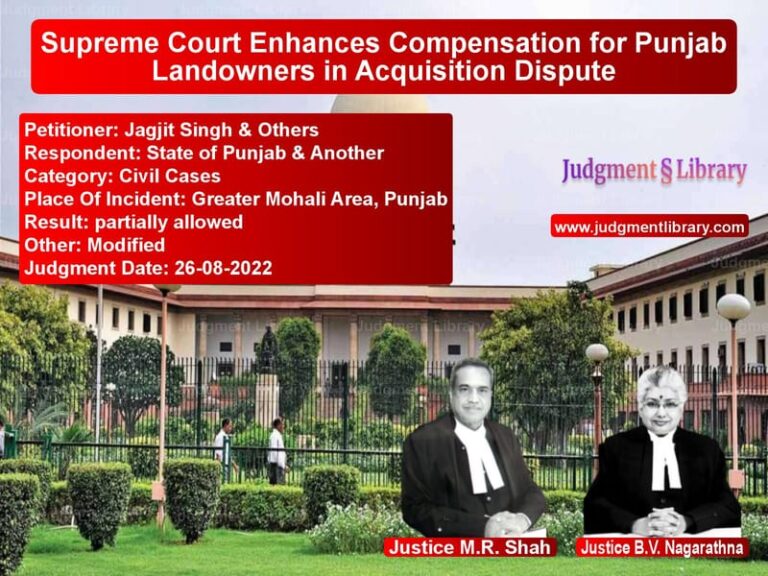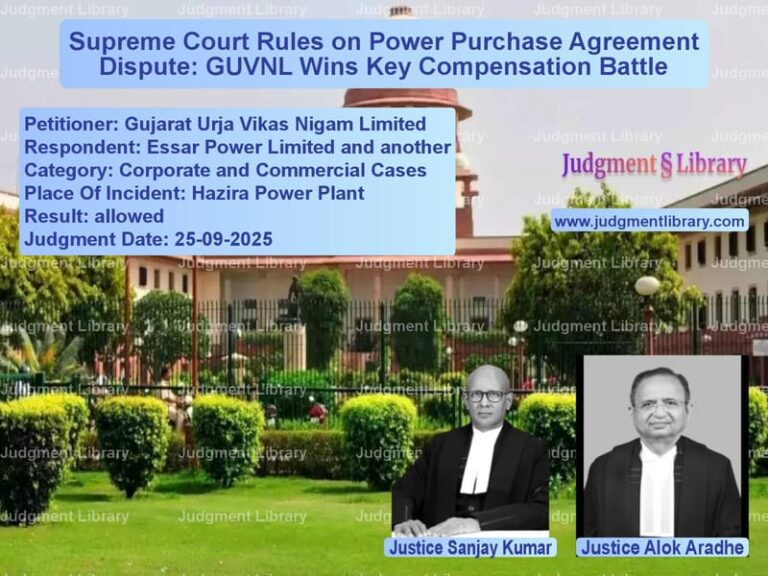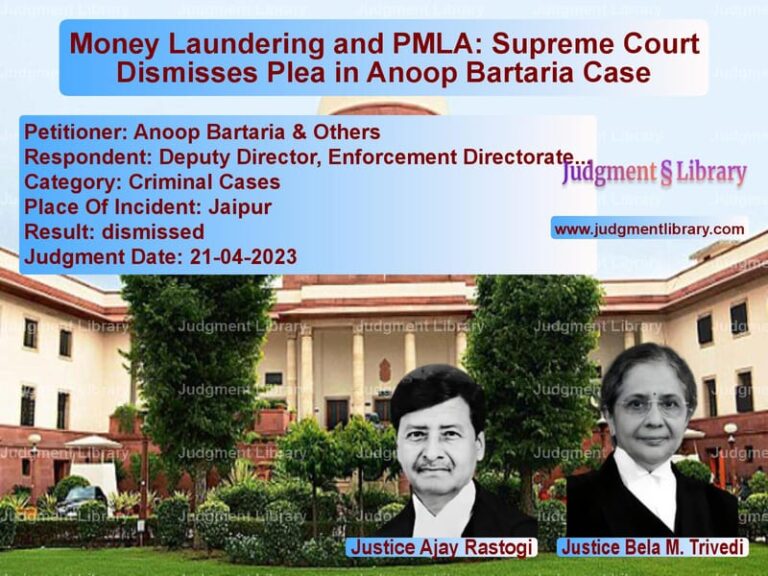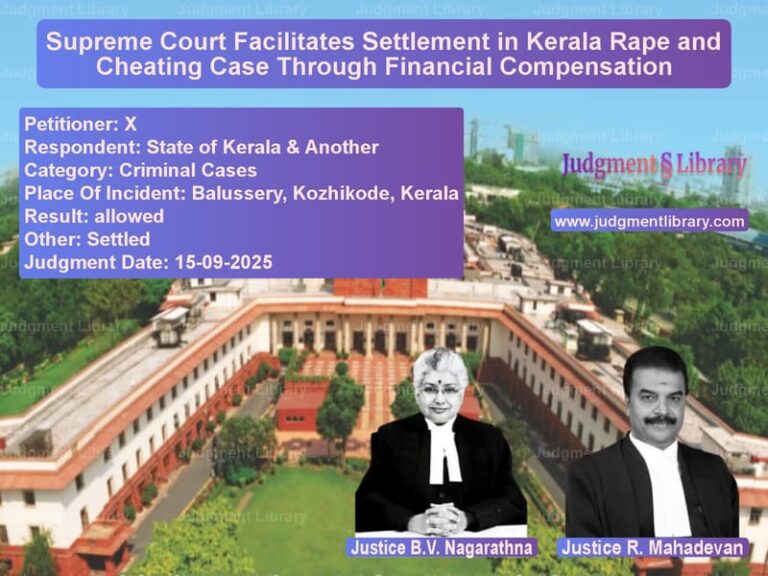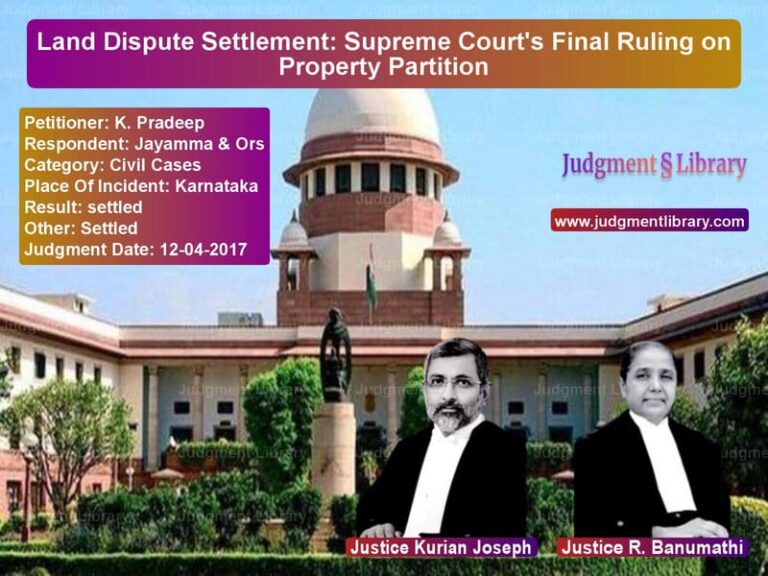Delhi Development Authority Wins Land Acquisition Dispute: Supreme Court Overrules High Court
The Supreme Court of India recently ruled in favor of the Delhi Development Authority (DDA) in a significant land acquisition dispute. The case revolved around whether land acquisition proceedings under the Land Acquisition Act, 1894, could be deemed to have lapsed under Section 24(2) of the Right to Fair Compensation and Transparency in Land Acquisition, Rehabilitation and Resettlement Act, 2013 (hereinafter referred to as the ‘2013 Act’). The Supreme Court set aside the Delhi High Court’s decision, holding that possession of the land had been taken, and compensation issues did not automatically lead to lapsing of the acquisition.
Background of the Case
The dispute arose from the acquisition of land in Delhi, where the possession was claimed to have been taken by the authorities on April 21, 2006. The landowners argued that since compensation had not been paid, the acquisition should be deemed to have lapsed under Section 24(2) of the 2013 Act. They filed a writ petition before the Delhi High Court, which ruled in their favor, relying on the Supreme Court’s earlier decision in Pune Municipal Corporation & Anr. v. Harakchand Misirimal Solanki & Ors., (2014) 3 SCC 183. Aggrieved by this decision, the DDA appealed to the Supreme Court.
Petitioner’s Arguments (Delhi Development Authority)
- The possession of the land in question was taken on April 21, 2006, which was well before the enactment of the 2013 Act.
- Under the precedent set by the Constitution Bench in Indore Development Authority v. Manoharlal & Ors., (2020) 8 SCC 129, non-payment of compensation alone does not result in lapsing of acquisition if possession has already been taken.
- The High Court erred in relying on the overruled judgment of Pune Municipal Corporation.
- The legislative intent of Section 24(2) of the 2013 Act is to protect landowners from inaction by authorities for five years or more, not to nullify valid acquisitions where possession was lawfully taken.
Respondent’s Arguments (Shiv Raj & Ors.)
- The respondents contended that compensation for the land in question had not been paid, thereby qualifying the acquisition for lapsing under Section 24(2) of the 2013 Act.
- They relied on the ruling in Pune Municipal Corporation, which held that if compensation had not been deposited in court, the acquisition was deemed to have lapsed.
- They argued that the authorities had failed in their obligations, and the 2013 Act was meant to ensure fair compensation for landowners.
Supreme Court’s Observations
- The Court noted that the High Court had relied on Pune Municipal Corporation, a decision that had been expressly overruled by the Constitution Bench in Indore Development Authority.
- The Constitution Bench in Indore Development Authority had clarified that non-payment of compensation does not result in lapsing of acquisition if possession has already been taken.
- The Court reiterated the principle that once possession is taken under Section 16 of the Land Acquisition Act, 1894, the land vests in the government, and there is no provision under the 2013 Act for divesting land already acquired.
- The legislative intent behind Section 24(2) was to provide relief where authorities had failed to take possession or pay compensation, not to invalidate properly concluded acquisitions.
Key Judicial Findings
- The Supreme Court reaffirmed that under the Indore Development Authority ruling, possession and compensation must both remain incomplete for Section 24(2) to apply.
- The Court ruled that since possession of the land had been taken in 2006, the acquisition could not lapse merely due to non-payment of compensation.
- The judgment clarified that the phrase “or” in Section 24(2) must be read as “nor,” meaning that both possession and compensation must be pending for the acquisition to lapse.
- The ruling upheld the government’s power to acquire land while ensuring fair compensation to landowners through alternative legal remedies.
Final Judgment
The Supreme Court ruled in favor of the Delhi Development Authority:
- The High Court’s judgment was quashed and set aside.
- It was held that there was no deemed lapse of acquisition.
- The land acquisition proceedings were deemed valid, and the authorities retained possession.
Implications of the Judgment
The ruling has significant implications for land acquisition cases across India:
- Clarification on Section 24(2): The decision reinforces that both possession and compensation must be incomplete for an acquisition to lapse.
- Legal Certainty for Land Acquisition: Government agencies can proceed with infrastructure projects without undue delays due to misinterpretations of the 2013 Act.
- Fair Compensation Mechanism: While the judgment upholds acquisitions, it ensures that landowners can still seek rightful compensation through legal remedies.
- Reduced Litigation: The ruling minimizes uncertainty and prevents unnecessary legal battles over land acquisition that have already been lawfully concluded.
Conclusion
The Supreme Court’s decision in Delhi Development Authority v. Shiv Raj & Ors. is a landmark ruling that settles the controversy surrounding the applicability of Section 24(2) of the 2013 Act. By overturning the Delhi High Court’s judgment, the Court has reaffirmed that land acquisitions do not lapse merely due to non-payment of compensation when possession has been taken. This judgment strengthens the legal framework for land acquisition while ensuring that landowners retain the right to fair compensation through established legal mechanisms.
Petitioner Name: Delhi Development Authority.Respondent Name: Shiv Raj & Ors..Judgment By: Justice M.R. Shah, Justice Ahsanuddin Amanullah.Place Of Incident: Delhi, India.Judgment Date: 19-04-2023.
Don’t miss out on the full details! Download the complete judgment in PDF format below and gain valuable insights instantly!
Download Judgment: delhi-development-au-vs-shiv-raj-&-ors.-supreme-court-of-india-judgment-dated-19-04-2023.pdf
Directly Download Judgment: Directly download this Judgment
See all petitions in Property Disputes
See all petitions in Specific Performance
See all petitions in Landlord-Tenant Disputes
See all petitions in Judgment by Mukeshkumar Rasikbhai Shah
See all petitions in Judgment by Ahsanuddin Amanullah
See all petitions in allowed
See all petitions in Quashed
See all petitions in supreme court of India judgments April 2023
See all petitions in 2023 judgments
See all posts in Civil Cases Category
See all allowed petitions in Civil Cases Category
See all Dismissed petitions in Civil Cases Category
See all partially allowed petitions in Civil Cases Category

